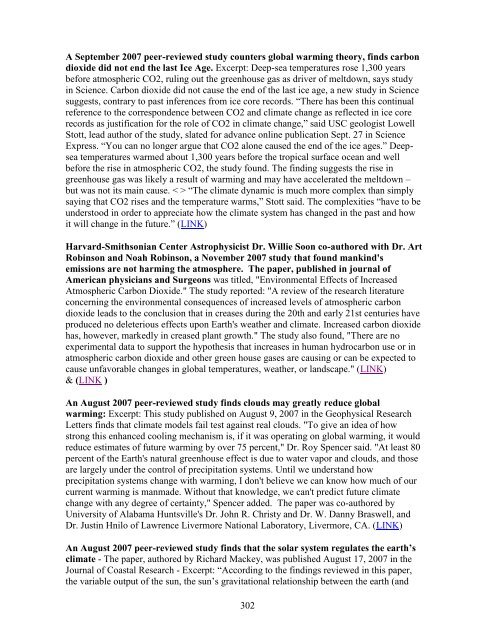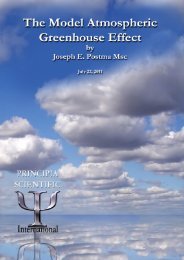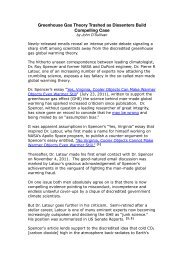Than 1000 International Scientists Dissent Over Man-Made Global ...
Than 1000 International Scientists Dissent Over Man-Made Global ...
Than 1000 International Scientists Dissent Over Man-Made Global ...
Create successful ePaper yourself
Turn your PDF publications into a flip-book with our unique Google optimized e-Paper software.
A September 2007 peer-reviewed study counters global warming theory, finds carbon<br />
dioxide did not end the last Ice Age. Excerpt: Deep-sea temperatures rose 1,300 years<br />
before atmospheric CO2, ruling out the greenhouse gas as driver of meltdown, says study<br />
in Science. Carbon dioxide did not cause the end of the last ice age, a new study in Science<br />
suggests, contrary to past inferences from ice core records. ―There has been this continual<br />
reference to the correspondence between CO2 and climate change as reflected in ice core<br />
records as justification for the role of CO2 in climate change,‖ said USC geologist Lowell<br />
Stott, lead author of the study, slated for advance online publication Sept. 27 in Science<br />
Express. ―You can no longer argue that CO2 alone caused the end of the ice ages.‖ Deepsea<br />
temperatures warmed about 1,300 years before the tropical surface ocean and well<br />
before the rise in atmospheric CO2, the study found. The finding suggests the rise in<br />
greenhouse gas was likely a result of warming and may have accelerated the meltdown –<br />
but was not its main cause. < > ―The climate dynamic is much more complex than simply<br />
saying that CO2 rises and the temperature warms,‖ Stott said. The complexities ―have to be<br />
understood in order to appreciate how the climate system has changed in the past and how<br />
it will change in the future.‖ (LINK)<br />
Harvard-Smithsonian Center Astrophysicist Dr. Willie Soon co-authored with Dr. Art<br />
Robinson and Noah Robinson, a November 2007 study that found mankind's<br />
emissions are not harming the atmosphere. The paper, published in journal of<br />
American physicians and Surgeons was titled, "Environmental Effects of Increased<br />
Atmospheric Carbon Dioxide." The study reported: "A review of the research literature<br />
concerning the environmental consequences of increased levels of atmospheric carbon<br />
dioxide leads to the conclusion that in creases during the 20th and early 21st centuries have<br />
produced no deleterious effects upon Earth's weather and climate. Increased carbon dioxide<br />
has, however, markedly in creased plant growth." The study also found, "There are no<br />
experimental data to support the hypothesis that increases in human hydrocarbon use or in<br />
atmospheric carbon dioxide and other green house gases are causing or can be expected to<br />
cause unfavorable changes in global temperatures, weather, or landscape." (LINK)<br />
& (LINK )<br />
An August 2007 peer-reviewed study finds clouds may greatly reduce global<br />
warming: Excerpt: This study published on August 9, 2007 in the Geophysical Research<br />
Letters finds that climate models fail test against real clouds. "To give an idea of how<br />
strong this enhanced cooling mechanism is, if it was operating on global warming, it would<br />
reduce estimates of future warming by over 75 percent," Dr. Roy Spencer said. "At least 80<br />
percent of the Earth's natural greenhouse effect is due to water vapor and clouds, and those<br />
are largely under the control of precipitation systems. Until we understand how<br />
precipitation systems change with warming, I don't believe we can know how much of our<br />
current warming is manmade. Without that knowledge, we can't predict future climate<br />
change with any degree of certainty," Spencer added. The paper was co-authored by<br />
University of Alabama Huntsville's Dr. John R. Christy and Dr. W. Danny Braswell, and<br />
Dr. Justin Hnilo of Lawrence Livermore National Laboratory, Livermore, CA. (LINK)<br />
An August 2007 peer-reviewed study finds that the solar system regulates the earth‟s<br />
climate - The paper, authored by Richard Mackey, was published August 17, 2007 in the<br />
Journal of Coastal Research - Excerpt: ―According to the findings reviewed in this paper,<br />
the variable output of the sun, the sun‘s gravitational relationship between the earth (and<br />
302





